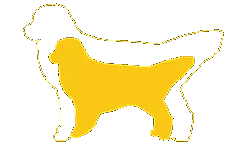Puppy Culture & ENS
At GoldenQuest, we believe every moment matters so we take puppy enrichment very seriously.
A Culture of "Super Dogs"
Since the Comfort Retrievers® began in 2003, we have prepared our puppies using both Early Neurological Stimulation and Jane Lindquist's "Puppy Culture" methods.
Early Neurological Stimulation, otherwise called the “Super Dog” Program and Jane Lindquist’s “Puppy Culture” socialization methods are the foundation of our preliminary puppy training. These programs allow our puppies to get off to a better start in life through sound desensitization, socialization, clicker conditioning, and much more!
These exercises condition your new puppy to comfortably meet new objects and people and teach them how to learn so that training is easy and smooth as they transition to their new life with you.
All puppy enrichment exercises are conducted with each puppy by our Puppy Culture team.
Learn about your puppy’s enrichment exercises and developmental journey below!
Before Birth
Dogs that are planning to whelp with us come to GoldenQuest when they are 6 weeks pregnant. They get suites to themselves that have a whelping area to nest throughout pregnancy, some toys to chew and lots of food. Twice each day, they go for a walk on our property, as well as two 10-minute mommy massages, which we call “Tummy Time. These massages not only help relax the pregnant dog but also allow her to build a bond with our staff. Studies have also shown that moms that receive “Tummy Time” have puppies that show enhanced cerebral development.
Newborn
During the Neonatal stage, your puppy begins their Early Neurological Stimulation which keeps up throughout this phase of growth and into the next. Your GoldenQuest puppy will receive Early Neurological Stimulation from 3 days old until 16 days of age.
Body handling is a key component to conditioning the puppies to be comfortable with not only being held but also having different extremities manipulated. Ideally, they will be more comfortable at veterinary appointments as well as with children. Near the end of this stage begins new object introduction to the puppies every day; anything from pots/pans to children’s toys. Introducing various objects at such a young age helps to foster curiosity and increase comfort levels with changes so that the puppies learn to adjust as their environments alter over time.
Dogs that receive ENS as puppies have:
- Stronger adrenal glands
- Higher stress tolerance
- Greater resistance to disease
- Stronger heart beats
- Improved cardiovascular performance
The five exercises of Early Neurological Stimulation are conducted for 3-5 seconds each. These exercises are listed below.
- Head held erect
- Head pointed down
- Tactile stimulation
- Supine position
- Thermal stimulation
At GoldenQuest, we complete these sessions by cuddling your puppy for 3 – 5 minutes.
Two Weeks
During the transitional stage (2 weeks to 21 days of age), your puppy gains their sight and hearing. While continuing the components from the Neonatal stage, they start receiving separation from their litter and mother and learn to feel at ease with humans. Since ENS ends on day 16, your puppy is given increased body handling and tactile stimulation.
Three Weeks
With ears opening during this next stage, the socialization stage, your puppy is introduced to sharp sounds. Puppies aren’t born with a fear response, so startling sounds at this impressionable age allow us to build up their startle recovery so they aren’t fearful of noises as easily down the road. Separation from their litter and mom, body handling, socializing with people, and new object introduction continues throughout this critical growth period.
Four Weeks
Now your puppy starts building a conditioned emotional response (CER) to the clicker. Using treats, they gain a reward history to the clicker, learning crucial behaviors such as recall and eye contact.
Here’s a quick overview of all your puppy learns beginning at four weeks:
- Recall is one of the most important behaviors any canine can learn because sometimes it can save lives.
- Because resource guarding is a common problem, we create a CER within your puppy that shows them that humans coming towards their toys or food is nothing to worry about.
- Your puppy is introduced to trusted adult dogs to allow exposure and socialization with dogs of various sizes, coat types, and energy levels.
- Our staff gets creative by setting up new challenges for your puppy to problem solve, which can result in a quicker learning curve.
- Your puppy is taught the concept of “manding” – to sit for attention or the desired object rather than jumping up or barking.
Five Weeks
While building off the lessons learned in previous weeks, puppies are introduced to more advanced objects and behaviors. This is also the time when the order of the litter is established. A happy, functioning litter communicates with growls, barks, and the occasional spat.
Six Weeks
This time is a fun mile-marker that includes a “Puppy Party.” While at the peak of their curiosity level, your puppy joins a party consisting of a small group of trusted individuals to perform exercises demonstrating confidence and socialization.
Seven Weeks
Now your little one receives their tattoo and potential parents in pick positions are notified to begin their selection process.
"Brandon (OY6) is the perfect addition to our family! He learned his name within days, and he is already sitting and working on shaking my hand! Thank you again!"
– The Jeffries Family
GoldenQuest Comfort Retrievers
Open Monday-Friday (9AM-5PM EST)
Versailles, KY 40383
